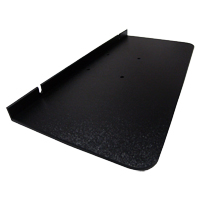| | Page last updated: Thu, 23-Jan-2020 14:56:31 ErgoCanada - Detailed Specification Page |   Back to Previous Page Back to Previous Page
ABS Plastic Low Profile Trayby Fox Bay Industries |
| | | Product Summary |
|---|
At only 0.375" thick, the ABS Low Profile Tray from Fox Bay Industries allows the user to find the most beneficial position for the keyboard without having to accommodate uncomfortable obstructions beneath the tray. When placed on the ABS Plastic Low Profile Tray, especially one installed on a keyboard arm with a similarly slim mounting bracket (such as the Ovation Low Profile Leverless Arm) a keyboard can be comfortably positioned at thigh level, and/or at a negative incline (tilted down) without restricting movement of the knees or thighs.
Note: To be sure this tray will fit an existing keyboard arm, please compare the mounting hole pattern on the installed arm with the Mounting Hole Pattern on the diagram.
The simple, clean design of the ABS Low Profile Tray is also free of obstructions on its upper surface, (such as raised edges or built-in wrist rests) that could increase the risk of injury to the sensitive pressure points on the underside of the wrists. The rear edge is raised to keep the keyboard in place when the tray is at a negative incline, and is notched in two places to route cables.
Composed of rigid ABS Plastic, and eleven inches deep (from front to back), the ABS Low Profile tray can accommodate specialty ergonomic keyboards (including adjustable or separated keyboards). The tray is available in widths of 30", 27", 24", 22", 20" and 18", with the 30" tray large enough for practically all keyboards and pointing devices.
The FB-T30x11-RH is specifically designed for users who mouse righthanded and want to keep their keyboard closer to centrally positioned in front of their monitor. Most desk layouts are designed symetrically which means that the tray is centrally positioned, moving the keyboard to the left of centre, forcing the user to postion themselves off-centre. The FB-T30x11-RH tray moves the tray 2.5" to the right, thereby moving the keyboard back closer to a central position. This actually works very well for users employing a keyboard with the numeric pad on the left side. The combination of the repositioning of both the keypad and the tray create a central positioning for the alphanumeric keys. | | Ergonomic Benefits |
|---|
Positions Keyboard and Mouse within the "Comfort Zone" - Keeping frequently used devices within the Comfort Zone allows the muscles of the upper body to remain relaxed and reduces the risk of overreach (left and right, up and down, and forward) injuries. Learn More About the Comfort Zone.
- Reduces Excessive Reach to the Left and Right - The larger models (30", 27" and 24") of the ABS Plastic Low Profile Tray allow users to position both input devices comfortably close to the body and at the same level relative to each other.
- Keeps the Shoulders Level - By allowing users to keep both input devices on the same level, the ABS Plastic Low Profile Tray eliminates the need to repeatedly lift, extend and lower one's shoulder when using the mouse. Dealing with a constant shoulder imbalance leads to an increased risk of repetitive strain injury. (Note that trays with a pivoting mousing surface can also raise or lower the mouse below the level of the keyboard and therefore carry the same potential risk.)
- Reduces Forward Reach - By positioning the mouse directly adjacent to the keyboard there is no need to reach forward to the desk surface—a common practice that creates a twist in the back and shoulders.
Allows Obstruction-Free Negative Inclination - With a thickness of only 0.375" the ABS Plastic Low Profile Tray allows users maximum freedom to create a negative inclination for the keyboard without obstructing the legs. A negative inclination creates the neutral wrist alignment known to combat the development of Carpal Tunnel Syndrome.
Learn more about Carpal Tunnel Syndrome.
Uniform Height and Material - The entire tray surface is at the same height and is made of the same material. There is no raised strip at the front edge of the platform that could put pressure on the wrists. (Raised areas, i.e. padded rests intended as palm supports on many keyboard trays are, in practice, often misused as wrist rests, becoming an ergonomic risk factor. Pressure on the wrist compresses tissue, restricts bloodflow and can lead to Carpal Tunnel Syndrome.)
| | Features |
|---|
- Spacious: Room for both a pointing device and a separate keypad. See "Usage Tips" for determining the necessary width.
- Keyboard Guard: Ensures keyboard and input devices stay in place when the tray is negatively inclined.
- Cable Management: Left and right slots in the keyboard guard allow for easy routing of cables from tray to computer.
- Durable: High quality ABS Plastic construction provides a firm surface with minimal bounce and flexion, yet is sufficiently resilient to prevent cracking or chipping from accidental impacts.
| | Images (Click on any thumbnail to view larger image) |
|---|

ABS Plastic Low Profile Tray (24" width shown)
| 
ABS Plastic Low Profile Tray - Surface Texture
|
| | Additional Resources |
|---|
- Foxbay Tray Hole Pattern: PDF
| | Technical Specifications |
|---|
| | Usage Tips |
|---|
- Determine the width of your keyboard tray by considering what input devices you wish to position on the tray. Measure out the widths of these devices, allowing at least 8" of width for mouse movement (sometimes more depending on the mousing device you will be using). A rule of thumb is to get the widest tray your workstation can accommodate. Make sure that when mounted on a keyboard arm your tray will have the necessary clearance. A wide tray will not be able to be raised above the surface of a corner workstation if the back corners of the tray cannot clear the desk.
Note: Please contact us for strategies to address this. - If you are a touch typist, position your ABS Plastic Low Profile Tray with a negative incline (if your keyboard arm is so equipped) and at a height that enables you to maintain a neutral wrist alignment. By raising the edge closest to you the wrist is naturally elevated above the fingertips and in line with the back of the forearm. The risk of restricting bloodflow or exerting pressure on the tissues is reduced or eliminated. This benefits both your keyboarding and mousing activity. Learn More About Positioning Your Keyboard Tray.
- If you are not a touch typist, you may find that a neutral or positive inclination is more appropriate for your method of typing. In addition, as a “hunt and peck” typist, you may prefer to position the keyboard higher than a touch typist would because you move your hands and arms more, and you aim for one key at a time.
- When selecting a Keyboard Arm on which to mount your ABS Plastic Low Profile Tray you should consider the range of elevation (above and below your worksurface), whether it supports a range of positive and negative inclination, and storability. Not all Keyboard Arms are equal and a higher price does not necessarily mean the best product. The ease of height and angle adjustment, and type of storage mechanism (steel ball-bearing is highly recommended) should be considered alongside the first set of criteria.
| | Models |
|---|
| For pricing, availability or to order this product, visit our online store. | | Model # | Description |
|---|
| FB-T30x11 | 30" wide x 11" deep | | FB-T27x11 | 27" wide x 11" deep | | FB-T24x11 | 24" wide x 11" deep | | FB-T22x11 | 22" wide x 11" deep | | FB-T20x11 | 20" wide x 11" deep | | FB-T18x11 | 18" wide x 11" deep | | FB-T30x11-RH | 30" wide x 11" deep, Offset mount for Right Hand Mousing |
| | Accessories |
|---|
| Model # | Description |
|---|
| FB-MP | Mouse Pad Accessory
Dimensions: 7.75" D x 7.125" W
Material: 0.125" thick rubber pad with lycra surface | | 8DG55-001-RET | Black, Retail Packaging | | 8DG55-002-RET | Blue, Retail Packaging | | 8DG55-003-RET | Red, Retail Packaging | | 8DC31-RET | Clear, Retail Packaging | | 8DGW55-RET | White, Retail Packaging |
|
|
| |

